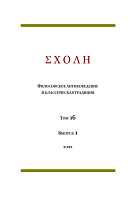ТЕОЛОГО-ФИЛОСОФСКАЯ «ШКОЛА» КУМРАНА
THE THEOLOGICAL-PHILOSOPHICAL “SCHOOL” OF QUMRAN
Author(s): Igor TantlevskijSubject(s): Philosophy, Education, Theology and Religion, Jewish Thought and Philosophy, History of Judaism, Philosophy of Religion
Published by: Новосибирский государственный университет
Keywords: Qumran manuscripts; Judaean theological and philosophical “schools”; Essenes; predestination; dualism; Rule of the Qumran community;
Summary/Abstract: In the first part of the article the author tries to reconstruct the peculiarities of organizational-administrative basis and content of the educational process in Qumran, and to analyze the impact of the success in learning and intellectual development of community members on their position in the congregation, but, most importantly, on the state of their soul, its disposition in the global war of good with evil and, ultimately, on its receiving retribution in the otherworld. In the second part of the article the author makes an attempt to identify some features of the theological-philosophical “school” formed in Qumran and to summarise key aspects of the theological and philosophical doctrines of Qumran, primarily based on the “Treatise on the Two Spirits” (1QS 3:13– 4:26): 1) Concept of the Creation of the universe through an intermediary “link” -“Knowledge” (dʽt) according to the “Design” (mḥšbh/mḥšbt) of God; the Qumran concept of mḥšbh/mḥšbt, probably implying the “Plan”/“Scheme”/“Project” of the universe, can be correlated with Plato’s concept of παράδειγµα. 2) Concept of predestination in correlation with the Essene doctrine of predestination in the context of the formation of Judaean “philosophical schools”. 3) Peculiarities of the Qumran dualistic doctrine of the two ways and two spirits and the origins of “nature of Truth” and “nature of Evil” in the framework of biblical monotheism; features of Qumran theodicy. 4) Correlation of the Qumran doctrine of “human nature” and “virtue” with the Essene ethical teaching according to Philo of Alexandria’s treatise “On Every Virtuous One Is Free”, XII, 80–84. The article also analyses the key designations of community leaders and self-designations of community members in an organizational and educational context.
Journal: ΣΧΟΛΗ. Философское антиковедение и классическая традиция
- Issue Year: XVI/2022
- Issue No: 1
- Page Range: 152-171
- Page Count: 20
- Language: Russian

